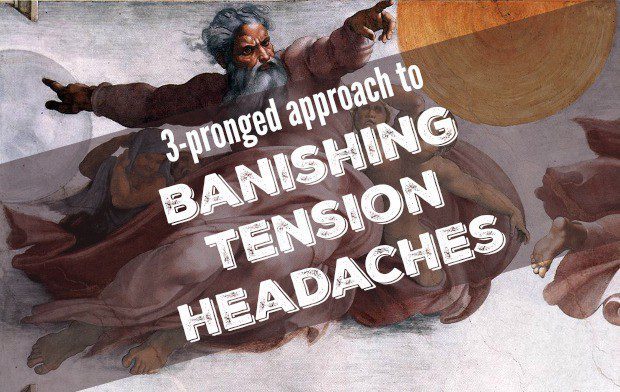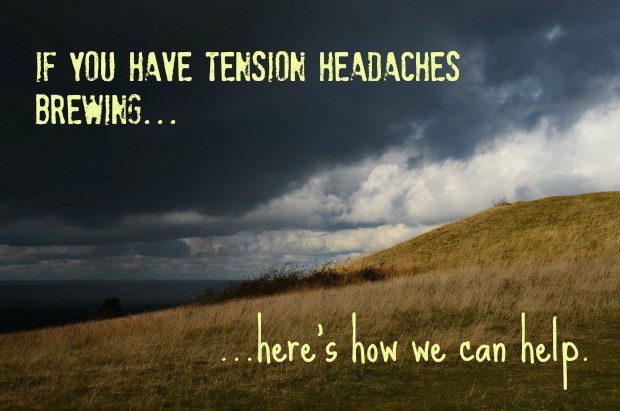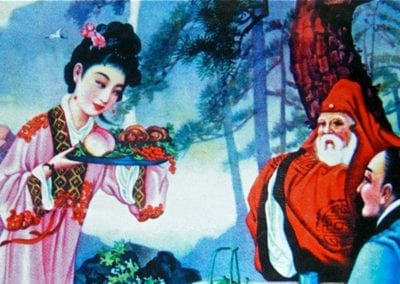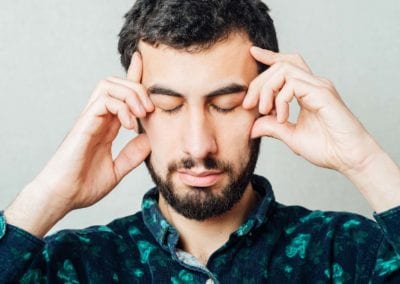Do you have tension headaches with any regularity? If so, congratulations—you’re part of a colossally large club. Of all headache types, tension headaches (also called myogenic headaches or muscle contraction headaches) are the most common. The World Health Organization reports episodic tension headaches for 70% of some populations.1 Here we explore the cause of tension headaches and natural ways to heal and treat tension headaches.
The vise-like grip of tension headaches: symptoms and characteristics
Tension headache pain is a result of muscle contraction in the head and neck. Patients at our acupuncture clinic in Washington DC generally experience it as mild to moderate pain, like a tight vise-like band around the head. Sound familiar? Other symptoms of tension headaches include:
- dull, aching pain in the head
- sensations of pressure and tightness across the forehead, on the sides, or back of the head, or behind the eyes
- tenderness and tightness in the neck and shoulder muscles
These headaches can actually be located in any region in the head or neck. They also vary greatly in frequency, intensity, and duration. Many patients report pain that persists for months or years, despite trials of multiple medications.
If you get tension headaches, you will probably experience one of two main categories of tension headaches: episodic and chronic.
- Episodic tension headaches can last anywhere from 30 minutes to a week and occur fewer than 15 days a month for at least 3 months. These are the most common form of tension headaches, usually occurring 2-3 times per month.2
- Chronic Tension Headaches can last hours and can go on continuously for long stretches of time. Tension headaches are considered chronic if they last for more than 15 days per month for 3 months or more.
Tension headache or migraine?
It can be difficult to distinguish frequent episodic tension headaches from migraines, and some individuals experience both. That said,tension headaches do not have the visual disturbances and nausea associated with migraines. Additionally, migraines have a neurological component that is not observed with tension headaches. Learn more about acupuncture for migraines.
What causes tension headaches?

The medical community identifies the most common trigger for tension-type headaches to be stress. The increased muscle tension and tenderness around the neck and shoulders—a hallmark feature of tension headaches—may be a result of this systemic aggravation of the pain and stress responses. Here we explore the physiology of stress responses and how acupuncture helps.
Tension headaches are usually precipitated by one or more of the common triggers listed below:
- Stress
- Working at a desk (to help prevent ergonomics-related paint, see our guide to proper office desk ergonomics)
- Eye strain (staring at a computer screen for long periods)
- Cold temperatures
- Alcohol
- Smoking
- Fatigue
- Cold or flu
- Sinus infection (our 8-step protocol for super healthy sinuses here)
- Caffeine
- Poor posture
The pharmaceutical medications typically prescribed by MDs for tension headaches
Most OTC and prescription medications recommended by doctors for tension headaches fall into the categories below:
- Pain relievers
- Muscle relaxers
- Antidepressants
Symptomatic medication such as pain relievers and muscle relaxers are not designed for frequent use (2+ times per week). Overuse of pain relievers can actually make symptoms worse. Additionally, muscle relaxers are known to be habit-forming and sedative. Antidepressants are prescribed as a preventive drug, but should be used with great caution.
Experts do not fully understand how they work,3 nor their myriad effects on the brain and bodily functions.4
Does acupuncture help with tension headaches?
Yes, acupuncture is very effective in treating both chronic tension headaches and episodic tension headaches. While they have a number of causes, tension headaches are most frequently caused by
- stress (and its concomitant muscle tension),
- muscle tension in the head and neck ( caused by poor posture, eye strain, or ergonomic problems).
Acupuncture provides a comprehensive three-pronged approach that addresses all of the typical causes of tension headaches. This approach helps:
- Provide natural pain relief, stimulating the nervous system to release natural painkillers
- Dissolve muscle tension by directing tension-easing blood flow to relevant areas, helping relax muscles
- Reduce stress by regulating the central and autonomic nervous system (more on the physiology of acupuncture and stress here).
How does acupuncture help headaches?

Acupuncture provides effective and lasting relief for tension headaches without the potential side effects of medications. The beauty of using acupuncture for tension headaches is that it works on three fronts, addressing both the symptoms and the cause:
- Relieves pain naturally: acupuncture prompts your body to release natural painkillers. By inserting small needles into specific sites on the body, the needles trigger a response from the nervous system. This response from the nervous system leads our brain to release a cascade of natural painkillers (endorphins and enkephalins). More on the fascinating physiology of how acupuncture works for pain relief here.
- Relaxes muscular tension: acupuncture needles signal the brain (via the nervous system) to direct blood flow to the affected areas. With increased blood flow in the head and neck, acupuncture helps relax the muscles there. This direction of blood flow addresses the physical mechanism causing the tension headache pain.
- Reduces stress and regulates the body’s stress response: this may be what best addresses the root of the tension headache problem. Acupuncture is well known for it’s ability to regulate the central and autonomic nervous system. In doing so, it appears to bring heart rate variability into healthy ranges, reducing the experience of stress. Acupuncture also strengthens the brain’s executive function, helping you deal with stress without the physiologically taxing sympathetic nervous system (being in “fight-or-flight” mode).
Acupuncture points for tension headaches
There are multiple styles of acupuncture and each acupuncturist will have their own approach. The needling protocol they choose will depend on a number of factors, including the particular patient’s set of conditions and sensitivities.
At our clinic, we often use the Balance Method when treating tension headaches. (The Balance Method is also known as Dr. Tan Style Acupuncture and Distal Acupuncture.) A hallmark of the Balance Method includes noticeable pain relief very soon after needle insertion.
Points are usually placed distally—at a distance from—the actual location of pain. Acupuncture approaches the body as a holistic, interconnected system. Points in one area of the body can, via the nervous system, have a desired effect on the affected area of the body. Most Balance Method points are located on the:
- hands
- feet
- arms
- legs
- head
How we treat tension headaches at Transformational Acupuncture

Our team of acupuncturists in Washington DC primarily treats tension headaches using Balance Method style acupuncture. Learn more about how we select acupoints using Balance Method acupuncture.
Acupuncture points for treating tension headaches vary, depending on where the tension/pain is located in the head and the underlying triggering factors. Primarily, the acupuncture treatments are designed to calm sympathetic nervous system activity and promote healing blood flow and relaxation into the muscles of the neck and upper back.
Research on the effectiveness of acupuncture for tension headaches
Acupuncture provides effective and lasting relief for tension headaches without the potential side effects of medications. Below are several studies that point to acupuncture’s effectiveness for tension headaches.
Acupuncture provides a powerful non-pharmacological tool in the management of tension headaches
The following study compared the effectiveness of acupuncture treatments vs. routine care in the management of tension headaches for over 2,000 participants. Researchers found statistically significant and clinically relevant benefits of acupuncture over routine care. Those who received acupuncture reported at least a 50% decrease in headache frequency, lower pain intensity for the headaches they did experience, and a marked reduction in analgesic use.5
Acupuncture found to be more effective than medication therapy for chronic headaches:
This meta-analysis of 31 studies analyzing the efficacy of acupuncture for chronic headaches shows that acupuncture provides significant reduction in headache intensity and frequency. Participants who received acupuncture not only experienced greater relief of headache symptoms, but also responded more quickly to the treatments than did their counterparts who received either medication therapy or “sham acupuncture.”6
Drastically fewer “headache days” for acupuncture participants:
This study compared the effectiveness of acupuncture treatment vs. no treatment in the alleviation of tension headaches. After 12 acupuncture sessions over the course of 8 weeks, participants reported 7.2 fewer headache days per month as compared to the non treatment group, who reported only 1.5 fewer headache days per month.7
Chinese herbal medicine for tension headaches
For those seeking natural therapies, Chinese Medicine has more than acupuncture up its sleeve: Chinese herbal medicine is an effective therapeutic option for tension headaches. At our herbal consultations, we custom-formulate every herbal preparation to your specific condition and constitution.
We use the diagnostic techniques of analyzing the patient’s symptoms, measuring the pulse, and observing the tongue to decide which herbs will make up the mixture. While each formula will vary depending on your individual needs, the herbs listed below are examples of ingredients commonly found in headache formulas. As a group, these herbs:
- alleviate pain,
- dilate the blood vessels,
- relax muscles,
- help the body deal with stress,
- focus the effects of the herbs on the head, neck, and upper back.
Qiang Huo – Notopterygium Root
Rhizoma et Radix Notopterygii
- antipyretic
- analgesic
Qiang huo is the go to herb to treat headaches affecting the back of the head, neck, and shoulders. It has pain-relieving properties that make it especially suited for tension headaches and heat-reducing qualities that help the body to release stress.
Ge Gen – Kudzu root
Radix Puerariae
- antispasmodic
- cerebral vasodilator
- antiplatelet
- antihypertensive
- antipyretic
- antidiabetic
Sweet, acrid, and cool, ge gen is a principal herb for releasing the muscle layer of the body. It’s an effective heat-clearing herb that reduces fever, helps the body to generate fluids, and can calm irritability. It’s smoothing action relaxes muscle spasms and dilates the blood vessels to alleviate pain.
Bai Shao – White Peony root
Radix Paeoniae Alba
- antispasmodic
- analgesic
- anti-inflammatory
- CNS suppressant
- antibiotic
- antipyretic
- antiplatelet
Bai shao belongs to a class of herbs known as “blood tonics.” It has powerful antispasmodic, anti-inflammatory, and pain killing properties that make it an important component of a variety of formulas. These properties, combined with its ability to calm the central nervous system, make it a very useful herb in alleviating the pain of migraines and preventing their recurrence.
Bai Zhi – Angelica root
Radix Angelicae Dahuricae
- analgesic
- anti-inflammatory
- antipyretic
- antibiotic
- antispasmodic
Bai Zhi is the go to herb for frontal headaches. It’s warm, dispersing nature makes it especially effective in treating pain and sinus issues. Its therapeutic actions are targeted to the head and skin, and its anti-inflammatory action reduces swollen tissues and helps the body to eliminate toxins.
Chuan Xiong – Szechuan Lovage rhizome
Rhizoma Ligustici Chuanxiong
- cerebral vasodilator
- antiplatelet
- anticoagulant
- sedative
Chuan xiong is a warming herb that is one of the most commonly used to activate blood circulation in the body. Its used in Chinese herbal medicine for many types of disorders related to blood flow, making it an excellent pain reliever. Its ascending and dispersing nature help to guide the pain relieving function of the herb to the head area, making it especially useful when treating headaches.
Gao Ben – Chinese Lovage root
Rhizoma Ligustici
- antibiotic
- antipyretic
- anti-inflammatory
Gao ben, the imperial herb for headaches at the top of the head, is essential in treating all headaches. It’s warm and acrid nature makes it an important herb in the treatment of pain as well. A guiding herb, gao ben directs the actions of all other herbs in a formula to the head.
Dealing with tension headaches in the Washington DC area?
With all of its conveniences, modern life can also give way to causes and conditions for tension headaches. Whether it’s stress, computer eye strain, overreliance on caffeine, poor desk ergonomics or “laptop neck,” so many of us find ourselves with the pain of chronic or episodic headaches.
Conventional treatments like painkillers and even anti-depressants can provide temporary relief, but also with risks of dependency and substantial side effects. That is why so many people come to our Washington DC acupuncture clinic: to seek a natural way to sustainably remedy their tension headaches.
Acupuncture helps relieve headache pain while also addressing root causes. Chinese medicine is applied to relax muscle tension, release natural painkillers and regulate our stress response over time.

- Read more about our acupuncture sessions and our herbal consults.
- Let us help you check if you have acupuncture coverage that could reimburse you for our services. Just fill out a short online Acupuncture Benefits Verification Form. It’s all online.
- Find out what happens at your first appointment.
- Give us a call at (202) 297-7404 or Schedule an appointment online.
About the Author
Nadia was the previous co-owner and operations manager of Transformational Acupuncture.
Sources Cited
- World Health Organization: Headache disorders
- Health Line: Tension Headaches
- Web MD: How Different Antidepressants Work
- Made in America: Things Your Doctor Should Tell You About Antidepressants
- National Center for Biotechnology Information: Acupuncture for tension-type headache
- National Center for Biotechnology Information: Acupuncture for the management of chronic headache: a systematic review
- National Center for Biotechnology Information: Acupuncture in patients with tension-type headache: randomised controlled trial




